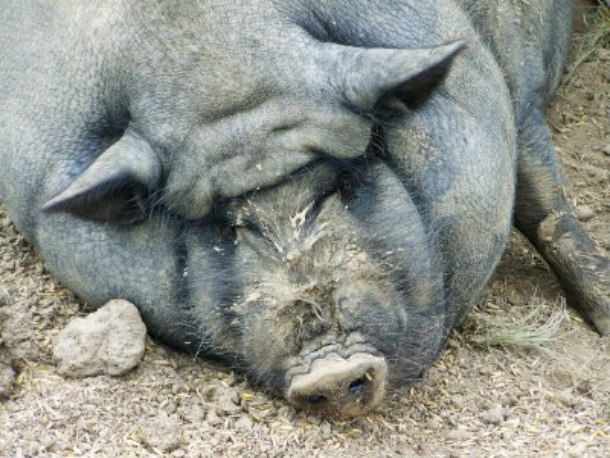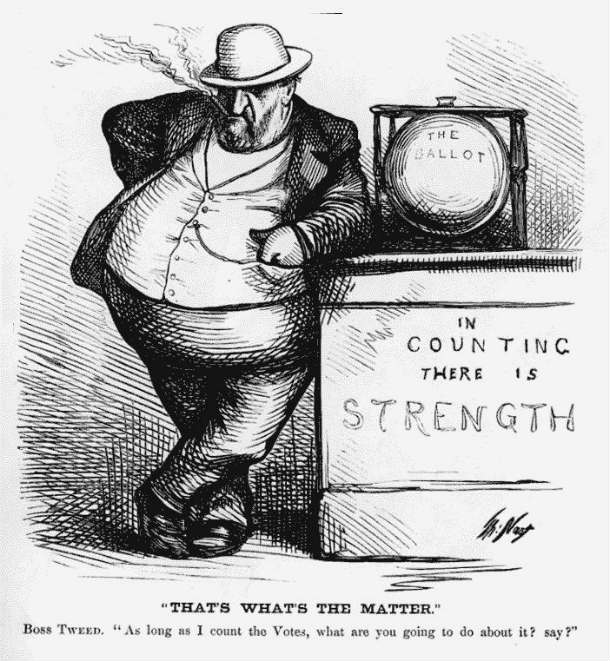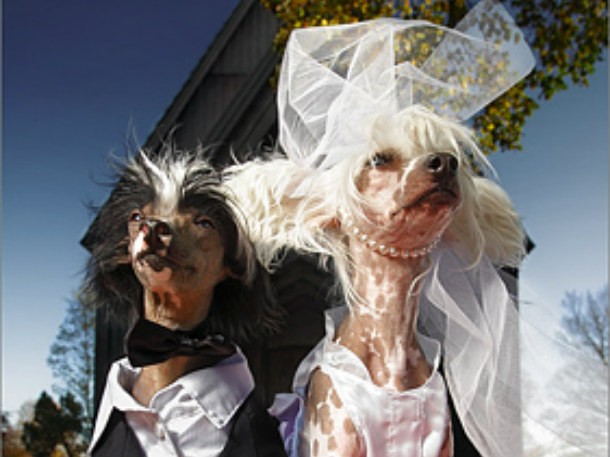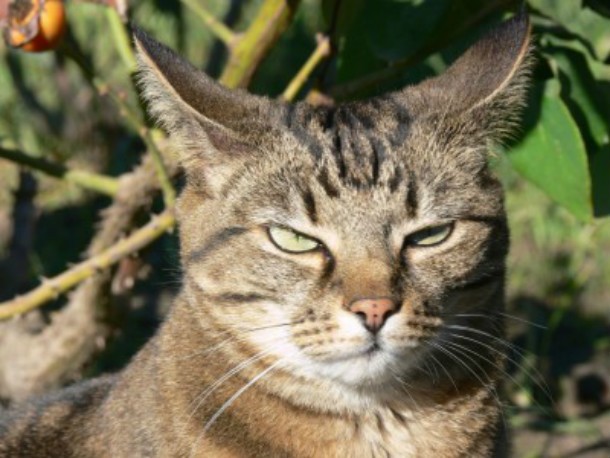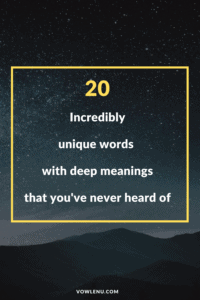There are many unique words in the English language that have deep meaning. Some of these words can be found in the dictionary, while others may not be as well-known. However, building your vocabulary can help you better understand the world around you and improve your communication skills.
Here are 128 unique words with deep meaning that you can add to your vocabulary:
- ambiguous
- apathetic
- archetype
- audacity
- autonomous
- benefactor
- benevolent
- bigotry
- boisterous
- bombastic
- bravado
- callous
- camaraderie
- candid
- candor
- capricious
- censure
- chagrin
- coercive
- collusion
- compelling
- contemptuous
- contentious
- conundrum
- cosmopolitan
- courtesy
- credulous
- cynical
- decentralization
- decorum
- defamation
- deride
- despondent
- disdain
- dissemination
- dystopia
- ebullience
- echelon
- effervescence
- eloquence
- elusive
- empirical
- endemic
- enigma
- enrapture
- epiphany
- epoch
- erratic
- ethereal
- exemplary
- extradited
- euphemism
- extraterrestrial
- exuberant
- facetious
- fallacy
- fanaticism
- fatalism
- fathom
- fervor
- heterogeneous
- homogeneous
- idolatry
- impetuous
- implausible
- inane
- incandescence
- incongruous
- ineffable
- inertia
- infatuation
- innocuous
- insidious
- integrity
- iridescent
- jaded
- jaunty
- jovial
- kinetic
- lethargic
- luminescence
- macabre
- magnanimous
- misanthropy
- magnanimous
- malevolent
- misanthropy
- nefarious
- nihilism
- obfuscation
- obsequious
- omniscient
- ostentatious
- paradigm
- partisanship
- pedantic
- pejorative
- perspicacious
- philanthropy
- platitude
- polygamy
- pragmatic
- precipitous
- prestige
- prodigal
- propaganda
- quintessential
- quixotic
- rambunctious
- rhetoric
- serendipity
- stereotype
- superficial
- syzygy
- transcendentalism
- ubiquitous
- unprecedented
- vacuous
- vitriol
- voluptuous
- wanderlust
- whimsical
- xenophobia
- zealous
- zesty
Letter A
Ambiguous – able to be interpreted in more than one way; open to more than one interpretation
Example sentence: The ambiguous wording in the contract caused a lot of confusion.
Apathetic – having or showing little or no emotion or interest
Example sentence: After years of being in a toxic relationship, I’ve become quite apathetic towards love.
Archetype – a perfect example of a particular type of person or thing
Example sentence: In many ways, she is the archetype of a strong and independent woman.
Audacity – a willingness to take bold risks
Example sentence: It took a lot of audacity for him to quit his corporate job and start his own business/ he was audacious in quitting his corporate job and starting his own business.
It can also mean that someone is cheeky and disrespectful. For example, if someone cuts in front of you in line, you might say, “That was pretty audacious of them!”
Autonomous – existing independently; not subject to another’s authority
Example sentence: As an autonomous individual, I don’t need anyone’s approval to live my life the way I want to.
Letter B
Benefactor – a person who provides help or financial assistance to another
Example sentence: My benefactor has been helping me pay for my college education.
Benevolent – well-meaning and kindly
Example sentence: The benevolent woman spent her life helping others.
Bigotry – intolerance toward those who hold different opinions from oneself
Example sentence: The bigotry and hatred expressed by some people during the presidential campaign were shocking.
Boisterous – noisy and full of energy
Example sentence: The boisterous party next door kept me up all night.
Bombastic – using language that is complex and intended to impress but insincerely; high-sounding but with little meaning behind the words.
Example sentence: His bombastic speeches were filled with empty promises.
Bravado – a show of boldness or daring, especially when it is false
Example sentence: He talks a lot of tough talk, but it’s all just bravado.
Letter C
Callous – showing or having an insensitive and cruel disregard for others
Example sentence: The callous way she talked about her ex-boyfriends showed that she was not ready for a serious relationship.
Camaraderie – a spirit of friendly, good-fellowship
Example sentence: There’s a strong sense of camaraderie among the employees of this company.
Candid – honest and straightforward; not hiding one’s true feelings or intentions
Example sentence: I appreciate your candid feedback. It helps me to improve my work.
Candor – the quality of being open and honest in expression
Example sentence: I appreciate your candor in telling me that my proposal was not up to your standards.
Capricious – quick to change; often changing suddenly.
Example sentence: The capricious nature of the stock market can make it a risky investment.
Censure – to express strong disapproval; intensely criticize
Example sentence: The company was censured for its unethical business practices.
Chagrin – a feeling of distress, disappointment, or embarrassment caused by the failure of one’s hopes or plans
Example sentence: I felt a great sense of chagrin when I realized that I had made a mistake.
Coercive – using force or threats to persuade someone to do something
Example sentence: The coercive methods used by the government to silence public disagreements is unacceptable.
Collusion – secret agreement or cooperation especially for an illegal or deceitful purpose
Example sentence: The companies were accused of collusion in a government investigation.
Compelling – so attractive, interesting, or important that it is difficult to resist or ignore
Example sentence: The compelling evidence showed that the defendant was guilty.
Contemptuous – feeling or showing a strong dislike for someone or something that you consider to be below you in standard or quality
Example sentence: The bully looked at me with a contemptuous expression on her face.
Contentious – controversial; likely to cause an argument or disagreement
Example sentence: The contentious issue of immigration reform has divided the country.
Conundrum – a confusing and difficult problem or question
Example sentence: The conundrum of how to solve the economic crisis is still unresolved.
Cosmopolitan – having wide international experience or interest; very sophisticated and widely traveled
Example sentence: She’s a cosmopolitan woman who has lived in many different countries.
Courtesy – the quality of showing politeness and good manners
Example sentence: It’s a courtesy to RSVP to a party if you’re planning on attending.
Credulous – too willing to believe that something is true, especially without questioning it or checking it first
Example sentence: He was a credulous child who believed everything he was told.
Cynical: skeptical or distrustful of people because they are considered to be driven by self-interest
Example sentence: The cynical woman didn’t believe anything the politician said.
Letter D
Decentralization – the process of moving power or responsibility away from a central authority
Example sentence: The decentralization of the government has led to more regional conflicts.
Decorum – correct or appropriate behavior or manner
Example sentence: The decorum of the event was disrupted by a group of rowdy protesters.
Defamation – the act or crime of making a false spoken statement about someone that damages their reputation
Example sentence: He was sued for defamation after he made false statements about the victim on social media.
Deride – to speak to or about someone or something in a way that shows you think they are unimportant or have no value
Example sentence: He derided her ideas as being too idealistic.
Despondent – feeling or showing hopelessness and despair
Example sentence: After his business failed, he became despondent and stopped leaving the house.
Disdain – a feeling that someone or something is not worthy of any respect or consideration; contempt
Example sentence: He looked at her with disdain when she told him she had only read one book in the past year.
Dissemination – the act of spreading information or ideas
Example sentence: The dissemination of false information can have dangerous consequences.
Dystopia – an imaginary place where everything is unpleasant or bad, often representing a possible future
Example sentence: The novel is set in a dystopian future where the government controls everything.
Letter E
Ebullience – great happiness, energy and enthusiasm
Example sentence: The ebullience of the crowd was infectious.
Echelon – a level or rank in an organization, profession, or society
Example sentence: She’s at the top echelon of her profession.
Effervescence – the quality of being lively and exciting
Example sentence: The child’s effervescence made her quite popular among her friends.
Eloquence: – the ability to communicate effectively and persuasively
Example sentence: His eloquence was one of the things that made him a successful politician.
Elusive – difficult to find, catch, or achieve
Example sentence: The elusive goal of world peace seems to be getting further and further away.
Empirical – based on actual experience or observation rather than theory
Example sentence: The empirical evidence showed that the theory was correct.
Endemic – existing or occurring naturally in a particular area or environment. This could be a disease, condition, native plant or animal.
Example sentence: Poverty is endemic in this region of the country.
Example 2: Malaria is endemic because it persists in particular regions such as Africa and South Asia.
Enigma – a person or thing that is mysterious or difficult to understand
Example sentence: He’s an enigma – we never know what he will do next.
Enrapture – to fill with great joy or admiration
Example sentence: The child was enraptured by the magic of the circus.
Epiphany – a moment when you suddenly feel that you understand or become aware of something in a new and important way
Example sentence: It was an epiphany for me when I realized that I didn’t have to please everyone all the time.
Epoch – a period of time in history or a person’s life when something significant happens
Example sentence: The Industrial Revolution was an epoch in human history.
Erratic – irregular or unpredictable in behavior or course
Example sentence: Her erratic driving made us all nervous.
Ethereal – very delicate and light in a way that seems too perfect for this world
Example sentence: The ethereal beauty of the snowflakes was breathtaking.
Exemplary – serving as a very good example
Example sentence: Her exemplary behavior made her a role model for other students.
Extradited – surrendered by one state or country to another, typically because the person has been accused or convicted of a crime
Example sentence: The criminal was extradited to the United States to stand trial.
Euphemism – a word or phrase used to avoid saying something that might be considered too direct, offensive or embarrassing
Example sentence: ‘passed away’ is a euphemism for ‘died’
Extraterrestrial – from outside the Earth or its atmosphere
Example sentence: There is no evidence that extraterrestrial life exists.
Exuberant – full of energy and enthusiasm
Example sentence: The exuberant child was bouncing off the walls.
Letter F
Facetious – not serious and often humorous; joking sometimes inappropriately
Example sentence: His facetious comments about the situation were not appreciated by everyone.
Fallacy – a mistaken belief, often held for emotional reasons, that is not based on fact or logic
Example sentence: The fallacy that all immigrants are criminals is sadly all too common.
Fanaticism – excessive enthusiasm and intense devotion to a cause or activity
Example sentence: The fanaticism of the fans was on full display at the game.
Example 2: The mistreatment of women in certain regions represents the worst of religious fanaticism.
Fatalism – the belief that events are predetermined by fate and cannot be changed
Example sentence: Many people have a fatalistic attitude towards life and believe that whatever will be will be.
Fathom – to understand something that is not easy to understand
Example sentence: I can’t fathom why anyone would want to hurt innocent people.
fervor – intense or passionate emotion
Example sentence: The fans’ fervor at the football match was palpable.
Letter H
heterogeneous – consisting of dissimilar or diverse elements
Example sentence: The class was heterogeneous in terms of age, gender, and background.
homogeneous: – of the same kind; alike
Example sentence: The class was homogeneous regarding age, gender, and background.
Letter I
Idolatry – the worship of idols, as though they were God
Example sentence: The idolatry of celebrities is a disturbing trend.
Impetuous – acting or done quickly and without thought or care
Example sentence: She made an impetuous decision to quit her job.
Implausible – not believable; not able to be believed
Example sentence: The implausible story that he told us just didn’t add up.
Inane – silly or pointless
Example sentence: The inane comments that he made were not appreciated by anyone.
incandescence – the state of being white-hot and glowing with intense heat
Example sentence: The incandescence of the sun was too much to look at directly.
Incongruous – not in harmony or keeping with the surroundings or other aspects of something; out of place
Example sentence: The incongruous sight of a penguin in the desert was quite bizarre.
Ineffable – too great or extreme to be described in words
Example sentence: The ineffable beauty of the sunset was breathtaking.
Inertia – a tendency to do nothing or to remain unchanged
Example sentence: The inertia of the company was a major problem.
Infatuation – a feeling of strong or excessive admiration or attraction
Example sentence: He had an infatuation with the movie star.
Innocuous – not harmful or offensive
Example sentence: The innocuous comment was taken the wrong way.
Insidious – seeming harmless but actually very harmful
Example sentence: The insidious effects of the virus were not immediately apparent.
Integrity – the quality of being honest and having strong moral principles
Example sentence: He is a man of integrity and can be trusted.
Iridescent – having lustrous rainbow-like colors that seem to change with movement
Example sentence: The iridescent fish was a thing of beauty.
Letter J
Jaded – bored or lacking enthusiasm, especially because of having experienced too much of something
Example sentence: The jaded traveler was not impressed by the sights.
Jaunty – having a cheerful, lively, and self-confident manner
Example sentence: The jaunty little dog was a joy to be around.
Jovial – good-humored or playful
Example sentence: The jovial mood of the party’s host was contagious.
Letter K
Kinetic- relating to or involving movement
Example sentence: The kinetic energy of the particles could not be seen by the naked eye.
Letter L
Lethargic – tired and sleepy; lacking energy or enthusiasm
Example sentence: The lethargic dog was not interested in going for a walk.
Luminescent – producing or emitting light, especially as a result of a chemical or electrical reaction
Example sentence: The luminescent system of the jellyfish was a fascinating sight.
Letter M
Macabre – involving or suggestive of death or violence
Example sentence: The macabre scene was not for the faint of heart.
Magnanimous – generous or forgiving, especially toward a rival or enemy
Example sentence: He was magnanimous in victory.
Malevolent – having or showing a wish to do evil to others
Example sentence: The malevolent creature hissed and spat at us.
Misanthropy – hatred of humanity
Example sentence: Her misanthropy was evident in the way she spoke about other people.
Letter N
Nefarious – extremely wicked
Example sentence: The nefarious activities of the criminal organization were finally exposed.
Nihilism – the belief that nothing in the world has any real meaning or value
Example sentence: His nihilistic outlook on life was quite depressing.
Letter O
Obfuscation – making something difficult to understand, usually intentionally
Example sentence: The obfuscation of the legal language made it difficult to understand the document.
Obsequious – too eager to help or please someone in authority
Example sentence: The obsequious waiter was always at her beck and call.
Omniscient – knowing everything
Example sentence: The omniscient being was all-seeing and all-knowing.
Ostentatious – trying to impress people by displaying wealth or success
Example sentence: The ostentatious car could be seen far down the street.
Letter P
Paradigm – a typical example or pattern of something; a model
Example sentence: The new paradigm of online education is changing the way we learn.
Partisanship – strong support for a particular person or political party
Example sentence: Partisanship was evident in the way they spoke about the other candidate.
Pedantic – insulting way to describe someone that is concerned with minor details and rules rather than the main issue
Example sentence: The pedantic teacher was always correcting her students.
Pejorative – expresses disapproval or negative sentiments
Example sentence: The pejorative term “welfare queen” is often used to describe someone who is lazy and lives off of government assistance.
Perspicacious – having or showing an ability to notice and understand things quickly
Example sentence: Her perspicacious mind was always one step ahead.
Philanthropy – the desire to help others, especially by giving money to good causes
Example sentence: Her philanthropy was well-known throughout Ireland, and she donated to many causes.
Platitude – a remark or statement that is often repeated and is true but has become dull or meaningless because it is too familiar
Example sentence: The platitude “time heals all wounds” was of little comfort to her.
Polygamy – the practice or custom of having more than one wife or husband at the same time
Example sentence: Polygamy is illegal in many countries.
Pragmatic – dealing with things sensibly, realistically and practically
Example sentence: Her pragmatic approach to problem-solving was a breath of fresh air.
Precipitous – done suddenly or impulsively without proper thought or care
Example sentence: His precipitous decision to quit his job was a mistake.
Prestige – high status or respect that comes from having a lot of power, success, or fame
Example sentence: The prestigious university was challenging to get into.
Prodigal – wasteful or extravagant with money or resources
Example sentence: His prodigal spending led to his financial ruin.
Propaganda – information, especially of a biased or misleading nature, used to promote a political cause or point of view
Example sentence: The propaganda campaign was successful in swaying public opinion.
Letter Q
Quintessential – embodying the most perfect or typical example of something
Example sentence: The quintessential Irish farmhouse was picturesque and charming.
Quixotic – idealistic but impractical
Example sentence: His quixotic dream of becoming a professional singer was never realized.
Letter R
Rambunctious – noisy and lacking in restraint or discipline
Example sentence: The rambunctious children were a handful, especially on long drives.
Rhetoric – the art of using language effectively and persuasively
Example sentence: The politician’s rhetoric was designed to appeal to the masses.
Letter S
Serendipity – finding something good or useful by chance
Example sentence: It was serendipity that led her to find the perfect dress.
Stereotype – a fixed or conventional notion or image
Example sentence: The stereotype of the lazy teenager is often inaccurate.
Superficial – not true or real; existing or appearing only on the surface
Example sentence: Her superficial beauty was only skin-deep.
Syzygy – the alignment of three celestial bodies in a straight line
Example sentence: The syzygy of the sun, moon, and Earth can cause an eclipse.
Letter T
Transcendentalism – the belief that spirituality is based on intuititive thinking and self reflection, allowing us to breakthrough to a higher spiritual level
Example sentence: His transcendentalism led him to believe in things that others could not see.
Letter U
Ubiquitous – present or being everywhere at the same time
Example sentence: The ubiquitous presence of technology in our lives is a recent phenomenon.
Unprecedented – never done or known before
Example sentence: The company’s unprecedented success was a surprise to everyone.
Letter V
Vacuous – having or showing a lack of thought or intelligence
Example sentence: His vacuous comments indicated that he had not really understood the question.
Vitriol – harsh or bitter criticism
Example sentence: The vitriol in her voice was unmistakable.
Voluptuous – brings pleasure to the senses; having a full, rounded shape, curvy (typically used to describe body types)
Example sentence: Kim Kardashian has voluptuous curves
Letter W
Wanderlust – a strong, instinctive desire to travel and explore the world
Example sentence: Her wanderlust led her to quit her job and travel the world.
Whimsical – fanciful, playful, unpredictable, imaginative
Example sentence: The whimsical decorations made the party feel like a fairytale.
Letter X
Xenophobia – fear or hatred of foreigners, people from different cultures, or anything that is strange or different
Example sentence: The xenophobia of the town was evident in their treatment of the refugees.
Letter Z
zealous – having or showing great energy and enthusiasm for something
Example sentence: He was zealous in his pursuit of the perfect cup of coffee.
Zesty – having a strong, pleasant taste or smell, full of flavour
Example sentence: The zesty lemonade was a refreshing change from the usual.
In Conclusion
There are many words in the English language that are deep in meaning and can be used to describe a wide range of things. These words are often used in literature and speech to convey a certain feeling or image. They are also useful in everyday conversation to add depth and interest. By exploring the different depths of meaning in words, we can expand our vocabulary and communication skills.
I’m an Irish tutor and founder of TPR Teaching. I started teaching in 2016 and have since taught in the UK, Spain, and online.
I love learning new things about the English language and how to teach it better. I’m always trying to improve my knowledge, so I can better meet the needs of others!
I enjoy traveling, nature walks, and soaking up a new culture. Please share the posts if you find them helpful!
Do you love unique words with deep meanings? Have you felt powerful feelings but haven’t found a word to accurately capture them?
Perhaps you’re a word nerd at heart, or you’re looking to spice up the way you express yourself.
If any of these are true for you, then you’re going to love this post!
My name is Gregory Venvonis. I’m a blogger, fiction author, and logophile at heart.
I put together this post in my spare time because I also love finding new ways to communicate and express myself.
Ideally, this list of unusual and uncommon words, complete with their corresponding meanings and etymology, will also give you a fresh way to explain your life and experiences!
Unique words and their meanings
Novalunosis
Definition: Novalunosis (n.) – The state of relaxation and wonderment experienced while gazing upon the stars.
Word origin: Vowlenu
Heliophilia
Definition: Heliophilia (n.) – The desire to be in sunlight.
Word origin: English
Related words: Heliophile, heliophilic, and heliophilous.
Nefelibata
Definition: Nefelibata (n.) – A day dreamer; writer who does not follow conventional standards.
Word origin: Portuguese & Spanish
Elysian
Definition: Elysian (adj.) – relating to divinity and peace
Word origin: Latin (Elysium)
Galaxomas
Definition: Galaxomas (n.) – The passionate urge to live on a theoretical faraway planet that feels uniquely different from Earth, yet hospitable for oxygen-breathing, sentient life.
Word origin: Vowlenu
Voorpret
Definition: Voorpret (n.) – The feeling of anticipatory pleasure experienced before an actual fun event or party.
Word origin: Dutch
Ebullience
Definition: Ebullience (n.) – To be cheerful and full of energy.
Word origin: The latin word: ebullientem
Related words: Ebullient.
Komorebi
Definition: Komorebi (n.) – Sunlight that filters through the leaves of trees; the interplay between light and when leaves when sunlight shines through trees.
Word origin: Japanese
Yūgen
Definition: Yūgen (n.) – The profound and mysterious feeling of beauty towards the universe.
Word origin: Traditional Japanese aesthetics.
Note: Yūgen is one of the seven Zen aesthetic principles for achieving Wabi-Sabi or the mindful approach to everyday life.
Nunchi
Definition: Nunchi (n.) – The subtle art and ability to listen and gauge other people’s moods.
Word origin: Korean. The literal translation is “eye-measure.”
Note: This is similar to the idiomatic expression of “reading the room” in English.
Arbejdsglæde
Definition: Arbejdsglæde (n.) – The feeling of happiness at work; employee satisfaction.
Word origin: Danish
Psithurism
Definition: Psithruism (n.) – The sound of leaves rustling in the wind.
Word origin: The Greek work psithuros.
Sturmfrei
Definition: Sturmfrei (adj.) – To have temporary freedom from housemates or parents.
Word origin: German. The literal translation is “storm-free.”
Razljubit
Definition: Razljubit (n.) – The feeling one has for someone once loved.
Word origin: Russian. The literal translation is “fall out of love.”
Blazemoche
Definition: Blazemoche (n.) – The therapeutic tranquility one feels when listening to the crackling and burning of firewood.
Word origin: Vowlenu
Eleutheromania
Definition: Eleutheromania (n.) – An intense desire for freedom.
Word origin: Greek
Emacity
Definition: Emacity (n.) – The fondness for buying things.
Word origin: Latin, from the word emacitas.
Novaturient
Definition: Novaturient (adj.) – desiring or seeking powerful change in one’s life, behavior or situation.
Word origin: Latin, from the word novāre.
Aviothic
Definition: Aviothic (n.) – The strong desire to be up in the air or to fly.
Word origin: Vowlenu
Ever felt the need to absquatulate? Got yourself into a kerfuffle at work? Or maybe you’ve come across a conundrum and aren’t sure what to do? If you aren’t familiar with a few of these words don’t fret, as they are just some of the thousands of words unique to English that you may never have heard before.
You might think you have a solid grasp of the English language, but there are so many words that make it up it really is tough to know every word. There are an estimated 171,146 words in the English language today, with an additional 47,156 obsolete words according to the Oxford Dictionary. So it’s no real surprise there are tons of words you may never have heard of or had to use during your everyday life.
But if you want to expand your vocabulary or have a passion for language, you might want to learn some of these unique words. That’s where we can help. We have collected 230 words unique to English below, along with the type of word they are and what they mean so you can start impressing everyone with your knowledge of the English language.
Words Unique To English: 230 Words and Their Meanings
1. Abibliophobi (noun) – The fear of running out of things to read.
2. Abomasum (noun) – The fourth stomach of a sheep or cow.
3. Absquatulate (verb) – To leave somewhere abruptly.
4. Acatalectic (adjective) – Having a full line of syllables.
5. Accismus (noun) – This foreign word comes from the Latin word accismus and means to feign interest in something when you really covet it.
6. Adagio (noun) – Something at a slow tempo.
7. Ailurophile (noun) – The word for someone who is a cat lover.
8. Alcazar (noun) – A Spanish word meaning palace or fortress.
9. Amok (noun) – A sudden assault against people that comes from nowhere.
10. Amphisbaena (noun) – A serpent in mythology that has a head at either end of its body.
11. Anachronism (verb) – Something (or someone) that is out of place in terms of time or chronology.
12. Antimacassar (noun) – A cover used to protect furniture.
13. Atingle (adjective) – To tingle with excitement.
14. Apricity (noun) – The warmth of the Sun in Winter.
15. Argle-bargle (noun) – A word used to denote someone who is waffling on or talking rubbish.
16. Aesthete (noun) – A person who is a lover of sensitive art.
17. Aurora (noun) – Natural light in the sky caused by particles from the sun interacting with the planet’s magnetic field.
18. Bafflegab (noun) – Someone speaking gobbledygook.
19. Bailiwick (noun) – Any area in which someone has superior knowledge.
20. Bamboozle (verb) – To confuse or baffle someone.
21. Bibble (verb) – To have a tipple of alcohol.
22. Bodacious (adjective) – Someone with a curvy body.
23. Borborygmus (noun) – The sound your stomach makes when you are hungry.
24. Brouhaha (noun) – When someone is overly excited about something.
25. Bugbear (noun) – A source of dread.
26. Bumbershoot (noun) – Another word for an umbrella.
27. Bumfuzzled (adjective) – A cool word that means a state of confusion or shock.
28. Bumfluff (noun) – When someone gets their first hairs on their face.
29. Cacophony (noun) – A jarring sound.
30. Calliope (noun) – A word that stands for the Greek Muse of heroic poetry and also doubles as an instrument similar to the organ.
31. Cattywampus (adjective) – When something is going badly or awkwardly.
32. Calamity (noun) – A great misfortune or disaster.
33. Cheesy (adjective) – Tacky.
34. Clinomania (noun) – An excessive desire to stay in bed.
35. Collywobbles (noun) – A strange feeling in your guts.
36. Connecticutian (noun) – Someone who is a resident of the state of Connecticut.
37. Consanguineous (adjective) – Descending from the same ancestor.
38. Conundrum (noun) – A problem that is difficult to solve.
39. Convivial (adjective) – A good host.
40. Cornucopia (noun) – An abundance.
41. Crestfallen (adjective) – Feeling dejected.
42. Cryptozoology (noun) – The search for legendary animals that don’t exist.
43. Defenestration (noun) – Throwing someone out of a window.
44. Demitasse (noun) – A small cup of black coffee.
45. Demure (adjective) – Reserved or shy.
46. Denouement (noun) – The final outcome of a story.
47. Discombobulated (adjective) – Confused.
48. Doohickey (noun) – A small object you can’t remember the name of.
49. Doppelgänger (noun) – Your double.
50. Dowdy (adjective) – Something old or shabby.
51. Draconian (adjective) – Something that is harsh or unfair.
52. Dumfounded (adjective) – Speechless.
53. Effervescent (adjective) – Bubbly or excited.
54. Elegance (noun) – To have grace or dignity.
55. Elixir (noun) – A liquid that can prolong life.
56. Epeolatry (noun) – Rare word meaning the worship of words.
57. Ephemeral (adjective) – Lasting a short time.
58. Epiphany (noun) – An illuminating discovery, often life-changing.
59. Erinaceous (adjective) – Something related to a hedgehog.
60. Ersatz (adjective) – Inferior substitute.
61. Ethereal (adjective) – Not from this world.
62. Eudaemonia (noun) – Happiness.
63. Facepalm (verb) – An expression of embarrassment.
64. Festooned (noun) – A decorative chain.
65. Finagle (verb) – To achieve something through trickery.
66. Flabbergasted (noun) – Being surprised or shocked.
67. Flawsome (adjective) – Someone who is awesome despite their flaws.
68. Flibbertigibbet (noun) – A silly person.
69. Flimflam (noun) – To trick or deceive someone.
70. Flummery (noun) – Porridge made with flour.
71. Flummox (verb) – Once common in American English, this word means to confuse.
72. Flyspeck (noun) – Something small or insignificant.
73. Fracas (noun) – A noisy argument or fight.
74. Frangipani (noun) – A perfume that smells like the flower plumeria.
75. Fuddy-duddy (noun) – An old-fashioned person.
76. Funambulist (noun) – A person who walks a tightrope.
77. Gadzooks (interjection) – To be surprised.
78. Gambit (non) – An opening remark. Also the name of an X-Men character.
79. Gazebo (noun) – A free-standing structure with no walls.
80. Gibberish (noun) – Something doesn’t make sense.
81. Gizmo (noun) – A gadget.
82. Glabella (noun) – The smooth area between your eyebrows.
83. Gossamer (noun) – Something light.
84. Guffaw (noun) – Boisterous laughter.
85. Gubbins (noun) – A foolish person.
86. Guru (noun) – Spiritual leader or teacher.
87. Haboob (noun) – A violent and sudden dust storm, typically found in Sudan.
88. Halcyon (adjective) – Prosperity.
89. Heliophile (noun) – Someone attracted to sunlight.
90. Hillbillly (noun) – Someone from a backward area.
91. Hodgepodge (noun) – A mixture of things.
92. Hokum (noun) – Utter nonsense.
93. Hoosegow (noun) – Another word for jail.
94. Hullabaloo (noun) – A loud disturbance.
95. Huzzah (noun) – Expressing joy.
96. Ignoramus (noun) – An extremely arrogant and self-titled person.
97. Impedimenta (plural noun) – Things that get in your way or stop you from carrying out tasks.
98. Incendiary (adjective) – Extremely hot.
99. Ineffable (adjective) – Hard to describe.
100. Infatuation (noun) – Obsessed.
101. Infinitesimal (adjective) – Something extremely small.
102. Inkling (noun) – Slight suspicion.
103. Interrobang (adjective) – A combination of the question mark and exclamation mark that looks like this; ‽.
104. Iridescent (adjective) – Colors that seem to change when looked at at different angles.
105. Izzard (noun) – Word that stands for the letter z.
106. Jabberwocky (noun) – Meaningless talk.
107. Jackasseries (noun) – Something stupid.
108. Jalopy (noun) – An old dilapidated vehicle.
109. Jentacular (adjective) – Relating to anything breakfast.
110. Juxtaposition (noun) – Two things side by side.
111. Kakorrhaphiophobia (noun) – Fear of failure,
112. Kaput (adjective) – Something that is destroyed.
113. Kerfuffle (noun) – A commotion or disturbance.
114. Kerplunk (adverb) – A loud, dull thud. Also the name of a board game.
115. Kismet (noun) – Fate.
116. Kumquat (noun) – A small round citrus fruit.
117. Kvetch (noun) – To complain continuously.
118. Lackadaisical (adjective) – Lacking life or spirit.
119. Lagoon (noun) – A body of water.
120. Lamprophony (noun) – Speaking loudly.
121. Languor (noun) – Weakness or weariness of body or mind.
122. Lassitude (noun) – Being fatigued or weary.
123. Limburger (noun) – A type of smelly cheese.
124. Limerence (noun) – Being obsessed and infatuated with another person.
125. Lithe (adjective) – Slim.
126. Logophile (noun) – Someone who loves words.
127. Lollapalooza (noun) – Something impressive.
128. Lollygag (verb) – To fool around and waste time.
129. Lugubrious (adjective) – Mournful.
130. Lummox (noun) – A clumsy person.
131. Machination (noun) – A crafty action with an evil outcome.
132. Macrosmatic (adjective) – Having a highly developed sense of smell.
133. Maelstrom (noun) – A powerful whirlpool.
134. Manifesto (noun) – A written statement declaring publicly the intentions, motives, or views of its issuer.
135. Melancholy (noun) – A feeling of sadness.
136. Mellifluous (adjective) – Having a smooth, rich flow.
137. Miffed (verb) – To be annoyed or frustrated.
138. Mixologist (adjective) – Someone who mixes drinks.
139. Mnemonic (adjective) – Relating to memory.
140. Mollycoddle (verb) – To give someone too much attention.
141. Mondegreen (noun) – Mishearing song lyrics or words in a conversation.
142. Moocher (noun) – Someone who lives off other people’s generosity.
143. Mufti (noun) – Ordinary clothes.
144. Mulligatawny (noun) – A curry-flavored soup made with chicken or beef stock.
145. Muumuu (noun) – A loose-fitting dress with patterns and bright colors. What Homer Simpson enjoys wearing.
146. Murmuration (noun) – The act of murmuring.
147. Myopic (adjective) – The scientific word for near-sighted.
148. Nabob (noun) – A wealthy person.
149. Nadir (noun) – The lowest point.
150. Nefarious (adjective) – Wicked or evil.
151. Nemesis (noun) – Arch rival.
152. Nincompoop (noun) – A fool.
153. Noctambulist (noun) – A person who walks while they are asleep.
154. Nonplussed (adjective) – Someone who isn’t bothered.
155. Noyade (noun) – A mass drowning.
156. Noxious (adjective) – Something dangerous or harmful.
157. Nudiustertian (adjective) – The day before yesterday.
158. Omphalos (noun) – The central point.
159. Onomatopoeia (noun) – Something named after the sound it makes.
160. Operose (adjective) – Tiresome.
161. Orrery (noun) – An apparatus showing the relative positions and motions of bodies in the solar system by balls moved by a clockwork.
162. Otalgia (noun) – Earache.
163. Panacea (noun) – A cure for everything.
164. Paradox (noun) – Something that contradicts itself.
165. Paraph (noun) – A flourish made at the end of a signature.
166. Pareidolia (noun) – Seeing shapes or images that aren’t there.
167. Pauciloquent (adjective) – Using few words.
168. Peely-wally (adjective) – Scottish slang for someone who looks pale or ill.
169. Peripatetic (noun) – A nomad.
170. Peterman (noun) – Another name for a fisherman or a safecracker.
171. Petrichor (noun) – The smell after it rains.
172. Phyllo (noun) – Thin dough used to make flakey pastry.
173. Pilgarlic (noun) – A bald-headed man.
174. Pimp (noun) – A person who exploits women for money.
175. Plethora (noun) – An abundance of something.
176. Pluviophile (noun) – Someone who loves the rain.
177. Pneumatic (adjective) – Related to gas.
178. Polyphiloprogenitive (adjective) – Extremely prolific.
179. Pother (noun) – A commotion.
180. Pristine (adjective) – Very clean.
181. Propinquity (noun) – Another word for proximity.
182. Psychotomimetic (adjective) – Relating to, involving, or inducing psychotic alteration of behavior and personality.
183. Quintessence (noun) – The ideal answer.
184. Quire (noun) – A collection of 24 or 25 papers of the same size and shape.
185. Raconteur (noun) – A good storyteller.
186. Ragamuffin (noun) – A poorly dressed person.
187. Razzia (noun) – To plunder.
188. Renaissance (noun) – A period in Italian history beginning in the 14th century and lasting until the 17th century.
189. Riposte (noun) – A quick or witty response.
190. Sanctimony (noun) – Hypocritical.
191. Sanguine (noun) – To be optimistic.
192. Sequoia (noun) – A type of tree.
193. Serendipity (noun) – The act of finding something valuable or interesting when you are not looking for it.
194. Sibilant (adjective) – Hissing sound.
195. Snickersnee (noun) – A large knife.
196. Somnambulist (noun) – A person who sleepwalks.
197. Sonder (noun) – An understanding that everyone else on the planet has their own complex life.
198. Sozzled (adjective) – Drunk as a skunk.
199. Sumptuous (adjective) – Rich or luxurious.
200. Supine (adjective) – Lying on your back.
201. Surreptitious (adjective) – Being stealthy.
202. Syzygy (noun) – A nearly straight-line configuration of three celestial bodies.
203. Taradiddle (noun) – A British word for nonsense.
204. Tergiversation (noun) – Being evasive and not straightforward.
205. Thwart (verb) – To put a stop to something unexpectedly.
206. Tittynope (noun) – A small amount of leftover food.
207. Trade-off (noun) – Giving one thing up for something else.
208. Trichotillomania (noun) – The compulsive desire to pull your hair out.
209. Ulotrichous (adjective) – Having wooly hair.
210. Vellichor (noun) – The wistfulness and nostalgia of a second-hand bookshop.
211. Verisimilitude (noun) – Similar to the truth.
212. Wabbit (noun) – To feel unwell.
213. Wanderlust (noun) – A passion for traveling.
214. Wassail (noun) – A warm drink, usually alcoholic.
215. Wherewithal (noun) – To have the resources or means.
216. Whippersnapper (noun) – A young and inexperienced person.
217. Widdershins (adverb) – A clockwise direction.
218. Winklepicker (noun) – A show with a sharp, pointed end.
219. Woebegone (adjective) – Experiencing great woe or being in a sorry state.
220. Xenotransplantation (noun) – The transplantation of an organ, tissue, or cells between two different species.
221. Xertz (noun) – To drink something quickly.
222. Yeet (interjection) – Slang word for excitement.
223. Yarborough (noun) – A hand in Bridge.
224. Yokel (noun) – Less than intelligent person from a small town.
225. Zaftig (adjective) – A round or plump figure.
226. Zeal (noun) – Eagerness.
227. Zeitgeist (noun) – The unique spirit of an era.
228. Zenith (noun) – To reach the highest point.
229. Zephyr (noun) – A gentle breeze.
230. Ziggurat (noun) – An ancient Mesopotamian temple tower. Often in the shape of a pyramid.

Tobias is a content specialist with over a decade of experience writing about men’s lifestyles for a variety of publications around the world. When not on his computer he enjoys traveling, eating pizza, and watching 80s action films.
Tobias is a content specialist with over a decade of experience writing about men’s lifestyles for a variety of publications around the world. When not on his computer he enjoys traveling, eating pizza, and watching 80s action films.
Literature
There are many reasons one might wish to expand their English vocabulary: Impressing someone on a first date or interview, finally beating your mom at scrabble, expanding your understanding of a second language, finding new PG-rated insults, or simply because English is fun.
Much like American culture, the English language has become a mix of words from many different languages and cultures over the centuries and has eight different dialects spoken in North America alone.
In addition to that, new words – such as glamping (noun: a mix of glamorous and camping, where you camp with air conditioning and other luxuries) – are evolving all the time and being added to the dictionary.
If you are one who wishes to add to your mental word bank, for whatever reason, here are 25 words that can be worked into your daily vocabulary with only a little bit of effort. Here are 25 Unique English Words You Should Add To Your Vocabulary.
Source: aschmann.net; oxforddictionaries.com
